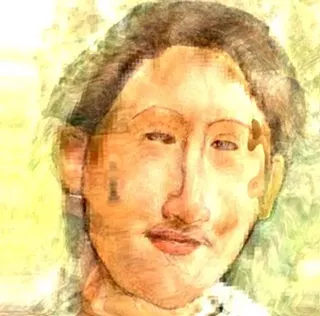However, LTW has never pretended to be a theater of social conscience; it's an organization that does its best to entertain people, usually with pretty good material, in a very small space. I Do! I Do! certainly entertains a lot of people, but that task must fall to the two cast members, because the material is as stale as 40-year-old wedding cake.
Tom Jones--not the pheromone-dripping Welsh pop singer, but an American scribe--provided the book and lyrics, and Harvey Schmidt penned the score for this 1966 musical based on Jan de Hartog's 1951 play, The Fourposter. From the vantage point of a bedroom, it follows a marriage through the first part of the 20th century.
I'll get to the good news--the part that LTW is responsible for--after the bad news, and that's the material itself. As I wrote in that 1992 review, "My Cup Runneth Over" is the only highlight in a generally undistinguished score, and the script itself is worse than undistinguished by today's standards.
The text lacks any sense of period; the entire marriage seems to unfold around 1955, as the script stumbles over all the relationship clichés of the I Love Lucy era.
Two critical issues underlie the central scenes. One is the infidelity of the husband, Michael; the other, which is what really dates this play, is wife Agnes' fear that her "life as a woman" is about to end with the departure of her children and the onset of menopause.
But these issues turn out to be little more than shallow water on which to float a couple of songs. And a problem simply evaporates at the end of a song instead of trickling through the remainder of the show as it would through the rest of the marriage.
Most offensive is Agnes' behavior when Michael threatens to leave her for a younger woman. Anticipating liberation, Agnes launches into a number more appropriate for a burlesque queen. Actress Molly Holleran and director Missie Scheffman wisely minimize the more tawdry aspects of this number, but they can't make us forget that what this really boils down to is the antiquated notion that only quietly married women are moral, and divorcées are whores.
Except for scholarly purposes, nobody now would revive one of those old "coon shows" from the turn of the last century, in which African Americans and whites in blackface sang and danced their way through every available black stereotype, all in the name of fun. So why do we still seek innocent pleasure in the good-natured sexism and quasi-misogyny of this play?
Perhaps it's because the Michael character is depicted as something of a pompous jerk, so we're not supposed to take anything here too seriously. Unfortunately, this is where Michael Martinez is least convincing; he's sweet and endearing in his more innocent moments, but in the central scenes during which Michael becomes petulant and selfish, Martinez turns into an actor pretending to be petulant and selfish, and stops being a real human figure.
If Martinez seems too affable of a fellow to add bite to his more cynical lines, at least he's a fully committed entertainer, giving his all to the songs and the dance numbers. Similarly, Holleran is nicely nervous and eager as the young bride, gradually compressing under the weight of her character's burden as the show progresses. Holleran is a classical singer whose voice could easily fill a concert hall or cathedral; rightly, she scaled it down for the LTW production, but even so, she seemed to be holding back a bit too much on opening night, compared to Martinez. Perhaps she was under the weather; her voice got a little ragged through the course of Act 1, but it fully recovered during intermission.
Scheffman, in her first directorial effort, has done her best to make us care about the characters and to move them around intelligently on a very cramped stage dominated by a four-poster bed. Similarly, Eva Tessler has done a remarkable job with the choreography in a tight space, and pianist Aryo Wicaksono most ably takes on the instrumental duties. Solid set and costume design complete an attractive production of I Do! I Do!, a show that really ought to be divorced from our contemporary society on the grounds of irreconcilable differences.











